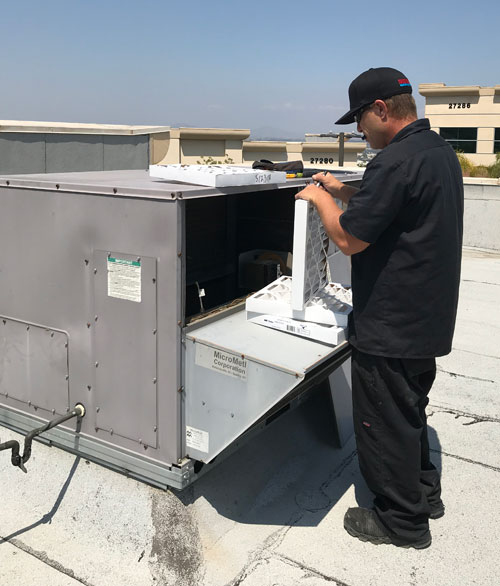
For a business in the Temecula Valley, the heating and air conditioning system is more than just a matter of comfort; it’s a mission-critical component of your daily operations. An HVAC failure on a sweltering summer day can make your retail space unbearable for customers, drain productivity in an office environment, or even spoil sensitive inventory. The cost of an emergency breakdown goes far beyond the repair bill itself—it includes lost revenue and a damaged reputation. This is why a reactive, “fix-it-when-it-breaks” approach is a losing strategy for any business. A proactive, preventative commercial HVAC maintenance plan is an essential investment to ensure reliability, manage costs, and protect your bottom line.
Commercial HVAC: A Different Level of Demand
A commercial HVAC system, especially the large rooftop package units common on many business establishments, is far more complex and subjected to much greater strain than a residential system. It runs for longer hours under more demanding conditions. The components are larger, more expensive, and require specialized knowledge to service correctly. A simple issue that might be an inconvenience in a home can be a catastrophic failure for a business.
The Core Benefits of a Commercial Maintenance Plan
Partnering with a professional HVAC company for a scheduled maintenance plan provides several key benefits that directly impact your business’s financial health.
- Drastically Reduces Unexpected Breakdowns: This is the most significant benefit. During a maintenance visit, a certified technician performs a comprehensive inspection and tune-up. They can identify and address small problems—like a worn belt, a failing capacitor, or a dirty coil—before they escalate into a major failure that shuts your system down during peak business hours.
- Improves Energy Efficiency and Lowers Utility Bills: A dirty and poorly maintained HVAC system has to work much harder to heat or cool your commercial space. Clogged filters, dirty condenser coils, and improper refrigerant levels can dramatically increase your system’s energy consumption. Regular tune-ups ensure your system is running at its peak efficiency, which can lead to significant savings on your monthly energy bills. As the U.S. Department of Energy points out for all systems, regular maintenance is key to maintaining optimal efficiency.
- Extends the Lifespan of Your Equipment: Your commercial HVAC system is a major capital investment. A regular maintenance plan is the best way to protect that investment. By cleaning components, lubricating moving parts, and ensuring the system isn’t under undue strain, you can significantly extend the functional lifespan of your equipment, delaying the need for a very expensive full replacement.
- Ensures Better Air Quality and Comfort: A maintenance plan includes cleaning or replacing filters and cleaning coils, which helps to improve the indoor air quality for your employees and customers. A well-tuned system also provides more consistent and reliable heating and cooling, creating a more comfortable environment for everyone.
Leading business publications like Forbes often highlight the importance of preventative maintenance for all critical business equipment as a key strategy for improving reliability and profitability.
Your Temecula Valley Commercial HVAC Partner
Don’t let an HVAC failure disrupt your business, disappoint your customers, or hurt your bottom line. A proactive maintenance plan is a smart, affordable investment in your operational stability and peace of mind. For business owners throughout the Temecula Valley, the team at Third Generation HVAC offers customized maintenance agreements and a full suite of commercial HVAC services. Contact us today to discuss a preventative plan for your business.
